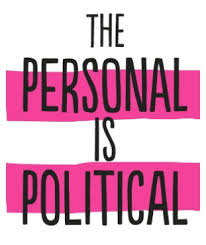 A Post from OSCLG member Rebecca Meisenbach, based on a paper she presented (and the discussion that followed) at the OSCLG Annual Conference in San Francisco last October.
A Post from OSCLG member Rebecca Meisenbach, based on a paper she presented (and the discussion that followed) at the OSCLG Annual Conference in San Francisco last October.
One year ago, I grudgingly went to a clothing store and bought a new pair of jeans that would fit my expanded waistline and backside. I’d been steadily gaining weight over the past 18 months. Six months of casual attempts to exercise more made no noticeable difference, and I literally popped a button off a pair of jeans before it occurred to me that the change in my size and shape was real.
My thyroid and other levels had been tested over the past year and were normal. I was generally healthy. But two weeks after the jeans purchase, I weighed still more. It was one thing to consider buying a new wardrobe, but I began fearing an unending increase in weight and turned to my first ever commercial weight loss program to see if it would help me stop or reverse the trend.
Part of my difficulty was that being small was part of my identity (one nephew calls me “tiny Aunt Becky”), yet the idea of trying to lose weight was very uncomfortable. I had absorbed an assumption that “Small  people who lose weight are anorexic.” I worried about the reactions of others. I felt badly that I couldn’t just go with the weight gain trend. I even worried that I was becoming anorexic. Then I’d remind myself that none of my clothes fit, and on it went.
people who lose weight are anorexic.” I worried about the reactions of others. I felt badly that I couldn’t just go with the weight gain trend. I even worried that I was becoming anorexic. Then I’d remind myself that none of my clothes fit, and on it went.
Because I’m a nerd (ahem– a communication scholar), I started daily journaling about my experiences, reflecting on my thoughts, the reactions of others, and the societal norms that intersected with my weight loss experiences. Here are a few thoughts based on my journaling and on presenting my initial ideas at a conference.
Who or what is in control?
Counting points gave me a sense of control over what I was putting in my body even as I was deferring control of that choice to a computer model. I was submitting to a system of rules, yet felt empowered by doing so as I watched the pounds come off at the rate of a pound or less per week.
In particular, it struck me that by teaching myself to count points, I was becoming dependent on the company’s product. I can’t tell you how many calories and fat I’ve been consuming daily, only points. I felt both in control and controlled.
Judging and being judged
As I began, I was convinced that friends and family would critique me for trying to lose weight. I made careful decisions about disclosing my weight loss efforts. What surprised me was how many of the people I disclosed to responded by sharing that they too had once tried the same program. They offered support and far fewer of the “you don’t need to lose weight” comebacks than I had expected.
As I began to experience success in finally losing some weight, one of the hardest parts of my journaling was acknowledging that my success also has implications for my perception of how much control others have over their weight. I wrote about wanting friends and family to join me in using this program and about moments of thinking that everyone could lose weight like this. I was horrified and ashamed to hear these thoughts in my head. But I want to acknowledge that they happened. I saw how easy it is to translate my own experience into others’. Seeing those thoughts on the page helped pull me back from them.
The personal is the political
Presenting these ideas at a conference was daunting. My roommate, noting my private nature, asked if I was really ready to expose such personal experiences to the public. After the presentation, several individuals approached me to say that they identified with my experience. I was called brave, which seemed odd at first but foreshadowed the range of reactions to come.
 Several people who are close to my own size shared that they frequently feel unable to talk about wanting to lose weight among their friends. Two women who had had gastric bypass surgery discussed the potential to feel judged by the fat activism movements. A woman who had struggled with an eating disorder shared how dismissed she feels when her condition is described as “easy” compared to the struggles of overweight individuals. Still other friends shared that my presentation had invoked negative reactions directed toward me from those who self-classify as overweight. My presentation may have felt dismissive (or worse) of their struggles. All of these reactions were emotionally powerful and strong.
Several people who are close to my own size shared that they frequently feel unable to talk about wanting to lose weight among their friends. Two women who had had gastric bypass surgery discussed the potential to feel judged by the fat activism movements. A woman who had struggled with an eating disorder shared how dismissed she feels when her condition is described as “easy” compared to the struggles of overweight individuals. Still other friends shared that my presentation had invoked negative reactions directed toward me from those who self-classify as overweight. My presentation may have felt dismissive (or worse) of their struggles. All of these reactions were emotionally powerful and strong.
By talking about my experiences (as a self-identified tiny person) with weight loss and weight loss discourse, I caused pain. And I am very sorry for that; it was not my intention. Truthfully, I felt physically ill as I tried to navigate the personal and professional reactions to my talk and regretted the whole endeavor several times. I hadn’t been brave; I’d been naïve.
Five months after that presentation, I have not yet started to write a scholarly piece from my 80 pages of journaling, but the range and power of the reactions my talk generated demonstrates that there is something worth discussing. In essence, I think the social and emotional difficulty of talking and writing about weight loss necessitates that I (and hopefully others) do just that—write and talk. Let’s talk.
A very wise and good friend of mine recently said, “As I have grown older, I have come to realize that pleasing everyone is impossible, but pissing off everyone is a piece of cake.” That same friend has also said to me that “You can’t please everyone, and there are some people who will never be happy, no matter what.” As someone who has struggled with an eating disorder my entire life, and has been deemed “lucky because I’m so skinny” more times than I can count, all while simultaneously struggling with the demons inside my brain, this is a topic that needs to be talked about, regardless of the hurt feelings it may cause. Important topics tend to be controversial, so don’t apologize. Controversial topics are difficult to discuss, yet necessary. We all struggle with our own demons and skeletons behind closed doors and behind the facades. We either talk about them authentically, with common courtesy, or we hole up into a ball and the darkness and fear to speak out.
LikeLike
Rebecca–
I am sorry to read that, at least thus far, you have not carried forward with your plans to write a scholarly piece using your journal as a starting point. As Erin (above comment) so thoughtfully pointed out, it is vital to talk about these issues openly and intelligently. While I did not see your presentation in San Francisco, so I am basing my response here on your blog entry, I certainly relate to the difficulty in navigating the personal and political as it relates to body image and self care. Further, I believe that one of the reasons such issues do cause folks to get fired up is precisely because so many of us to relate to those difficulties. But relating to them doesn’t mean it’s easy to unpack something so deeply embedded personally and socially. I would hope that you will help us move forward in that journey by moving forward with your project. Perhaps adding a section on the pain–both yours and your critics–bubbling around the response to your presentation will provide an excellent dimension to your work.
Best of luck,
Shannon
LikeLike
Shannon – Sorry I missed this earlier – it went to my spam folder for some reason. I trust Rebecca will really value this input – even if it’s getting to her a bit late.
Kathy (moderator of OSCLG blog)
LikeLike